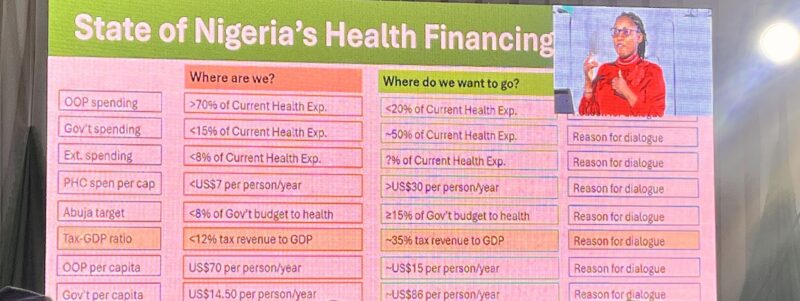In order to achieve Universal Health Coverage, Nigeria must strengthen its health financing systems and build stronger links between research and policymaking.
This was the central message from experts and policymakers at the ongoing National Health Financing Policy Dialogue in Abuja.
The dialogue, which run from 1-4 September brings together health officials, development partners, civil society groups and the private sector to craft new strategies for sustainable health financing in Nigeria.
The four-day event, themed “Reimagining the Future of Health Financing in Nigeria,” is expected to produce commitments to reduce out-of-pocket spending, improve accountability, and strengthen domestic funding for the health sector.
Financing pressures
Speaking at the event, Health financing expert, John Ataguba, said Nigeria’s reliance on direct payments by patients is unsustainable and inequitable.
Mr Ataguba described the dependence on such payments as “really problematic,” noting that they account for more than 70 per cent of current health expenditure.
He said financial protection will improve when out of pocket spending falls below 20 per cent.
“When people pay out of pocket, it harms them a lot. It pushes them into poverty and prevents them from living a good standard of life,” he said.
Mr Ataguba argued that government financing should rise well above present levels, pointing to very low per capita public spending.
“Nigeria spends only about $14 per person on health compared to household out of pocket spending of $70,” he said.
He noted that the balance must be corrected to move the country towards Universal Health Coverage, noting that primary healthcare remains neglected despite being the foundation for stronger outcomes.
“Primary healthcare is the backbone of every health system, and Nigeria must push this spending level higher if it is committed to improving service delivery,” he said.
He lamented that the Abuja Declaration target remains unmet and urged rapid expansion of insurance coverage from the low base of fewer than one in 10 Nigerians, alongside improved accountability and timely budget releases.
Bridging research and policy
During a panel discussion, academics and development partners highlighted the urgency of aligning research evidence with policy decisions, arguing that sustainable financing for Nigeria’s health sector requires not only adequate resources but also institutions capable of translating findings into action.
Chigozie Uneke, Professor of Health Systems and Vice-Chancellor of the David Umahi Federal University of Health Sciences (DUFUHS), highlighted the persistent gap between academic research and policy implementation in Nigeria.
Mr Uneke noted that universities generate substantial volumes of research, much of which never reaches policymakers or informs practice.
He described this disconnect as a major challenge, emphasising that the “publish or perish” culture in academia often prioritises quantity over policy relevance.
He proposed that government-funded research grants be linked to ministry priorities, ensuring that researchers focus on studies with practical policy impact.
Kamil Shoretire, Director of Research, Policy and Statistics at the Federal Ministry of Health and Social Welfare, agreed that misalignment and weak communication remain major challenges.
Mr Shoretire urged researchers to share findings proactively and emphasised that ongoing reforms are increasingly evidence-based but require stronger state-level engagement to expand health insurance coverage.
“Let the government know what you are doing in your various places on things that can impact or change the life of the Nigerian citizen for the better,” he said.
“Consistent communication is essential for translating evidence into action.”
READ ALSO: Over one billion people living with mental health conditions globally- WHO
Susna De, the Deputy Director for Health and Nutrition, Ethiopia at the Gates Foundation, called for routine platforms that bring policymakers, researchers, and think tanks together before important decisions are made.
Ms De stressed the importance of timely data driving timely action.
“The goal is not to publish in the Lancet or in Nature. It is whether those results were used, or if anyone took any action upon them. That is a measure of success,” she said.
She said it is important for research to directly inform policy and implementation.










